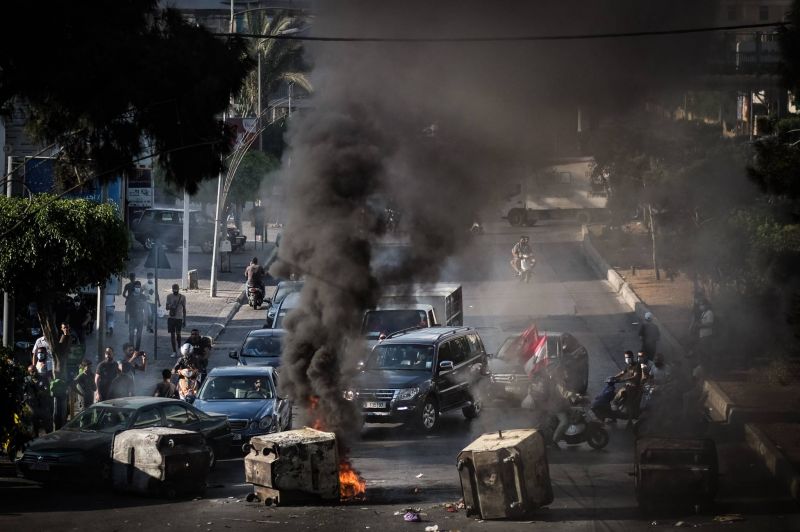
Protesters took to the streets as the local currency continued its freefall and the government seemed poised to adjust its fuel subsidy policy. (Credit: João Sousa/L’Orient Today)
BEIRUT — Protests wrangled Lebanon again on Thursday as the lira plunged to yet another record low and the government left the fate of fuel subsidies in the balance.
The US dollar was selling at a rate of LL16,000, according to several currency exchange applications — a depreciation of more than 90 percent since mid-2019, when the country’s economy started bottoming out. An exchanger who spoke with L’Orient Today on condition of anonymity said he would follow this rate until the full market opens on Friday morning.
In and around Beirut, protesters burned tires on the airport road and in Bir Hasan; others held a sit-in in front of Banque du Liban’s headquarters before marching through the Hamra area. Meanwhile, demonstrators blocked the northbound side of the Jal al-Dib highway.
In Tripoli, a few dozen people marched past the homes of local politicians and blocked the city’s main al-Nour Square, while in Saida demonstrators blocked Elia Square and threw rocks at BDL’s local offices.
With the lira in freefall, the cost of goods and services has soared, putting the cost of everyday items out of reach for a majority of the population. According to figures released by the Central Administration of Statistics on Tuesday, prices have increased by almost 120 percent since May 2020, the 11th month in a row that year-on-year inflation has been in the triple digits.
Even the prices of the most basic goods that are meant to benefit from the state’s flailing subsidy scheme, such as bread and gasoline, are routinely rising.
Meanwhile, the government, which has been operating in caretaker capacity since Hassan Diab resigned in the aftermath of the Aug. 4 port explosion, has failed to implement a financial rescue plan. The political class has proved unable even to make strides to form an empowered cabinet that could devise such a plan, leaving conditions in Lebanon to worsen by the day.
Most recently, gasoline rationing has throttled roads throughout the country, with importers saying the central bank is no longer providing them with the dollars they need to bring in fuel from abroad. Representatives from the medical sector and bakeries have made similar claims about drugs and medical supplies and sugar.
Since 2019, BDL has provided fuel importers with dollars at the official rate of LL1,507.5 to cover 90 percent of the value of essential imports even as the currency’s market value slipped. But with BDL’s foreign currency reserves at a critically low level, the central bank is limiting the lines of credit it is opening.
With the crisis mounting, President Michel Aoun headed a meeting at the Presidential Palace with BDL Gov. Riad Salameh, caretaker Finance Minister Ghazi Wazni and caretaker Energy Minister Raymond Ghajar on Thursday morning.
Following the meeting, Aoun’s office said the officials had agreed on “exceptional measures” that would allow the central bank to contain the problem, without providing further details. When reached by L’Orient Today, representatives of the Finance and Energy ministries declined to give information on the proposals.
However, L’Orient Today’s sister publication, L’Orient-Le Jour, reported that officials were leaning toward raising the rate at which Banque du Liban subsidizes fuel imports from LL1,507.5 to LL3,900, which would almost certainly translate to an increase at the pumps.